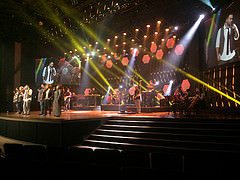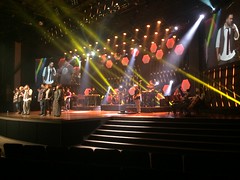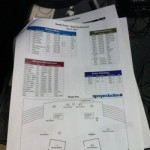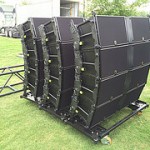
In the PM
One of the bigger challenges of the last couple of years for me came from adding two more services on Sunday. When I originally came on staff our service times in the East Auditorium were 9am, 11am, and 12:45pm. We had one crew for the day, and they would just handle all three services. A couple years ago we cancelled our 12:45pm service and added 4:30pm and 6:30pm service times, and that has made things interesting.
At the time we added the services, I didn’t believe it would be sustainable for one person to mix all day. I have very strong memories of my first year working for a church where I’d be in around 7am, work the morning “big church” services, grab a quick lunch and be back by 1pm to start preparing for a middle school service in the late afternoon, get a little downtime followed by a high school service, then strike everything and go home sometime around 9pm. Within a year this had seriously burned me out. I learned a valuable lesson through this, though, in terms of setting limits for myself, and there’s a reason there are studies floating around that show once you move past an 8-10 hour day productivity goes down, but I digress.
So with my previous experiences still floating around my head, I knew over the long haul having one person mix all services for the day would probably not be sustainable. Since implementing our PM services at North Point, I have mixed all day on occasion, and while it’s certainly doable here and there, as many of you who mix many weekend services already know, it’s rough to do on a repeated basis. So my goal from the initial launch was to put in place a plan that could be sustainable for myself and the rest of our crew for the long haul, and that meant splitting the load amongst our team.
The way things have settled in and currently stand is we have two audio crews on Sunday: an AM crew and PM crew. The AM crew is in around 6-6:15am and work the morning rehearsal, 9am, and 11am services. Then the PM crew comes in around 2:30pm for afternoon rehearsal, 4:30pm, and 6:30pm services. The AM crew consists of an A1/FOH engineer, Monitor engineer, and A2. The PM crew uses only a FOH engineer and Monitor engineer. I don’t typically have an A2 in the afternoon because by the time it rolls around everything is pretty much dialed in, and the crew doesn’t usually need the additional help. Wednesday night rehearsals are primarily staffed by our AM crew, although I try and have as many PM guys on hand as possible so they know what’s going on before they show up on Sunday. They’re also a big help at rehearsals if we’re short-staffed in our other auditorium or if there are new crew members training that night.
The biggest challenge in implementing two crews has been the hand-off from AM to PM. Traditionally I’ve tried to keep workflows somewhat open for our engineers in that I’m not as concerned about how things get done so much as they get done and get done right. For example, different engineers may like to lay the console out differently and use different processors/mics/etc., but ultimately the end goal is the same for all the guys on our crew. So my thinking has generally been to try and let guys work in ways they are comfortable. At the end of the day I’m more interested in whether the mix is great and the band is happy with their monitors than how someone got it there. But going to multiple crews changed this a bit.
If you let everyone do things his way, it’s much more challenging for the next guy to take over their mix which is essentially what we’re doing with two crews. I’m still maintaining some of the individuality of different engineers, but there are certain ways of doing things that we have had to make a little more standardized in order for our PM engineers to be successful. For example, console layouts stay pretty much the same, and notes need to be left and communicated to afternoon crew.
In terms of FOH engineers, I went from mixing maybe 2 or 3 Sundays a month to mixing every week outside of me taking personal/vacation time. One of the interesting things I found with FOH was when guys came in behind me to drive my mix, the afternoons were close enough to the morning that everyone was happy. However, when I would bring those same afternoon guys in behind different AM engineers, consistency between AM and PM services dropped. And these other AM engineers were not sub-par by any stretch: these were all guys I trust and have even stolen tricks from.
As far as how the hand-off works, most of the PM FOH engineers come in a little early and flip the console over for virtual soundcheck. They can play through tracks from the morning figuring out their moves, and they also have the ability to pump the AM mixes direct into the PA so they can listen to them exactly as they happened in the morning, mix moves and all.
I currently have three engineers who mix FOH for the PM services. One of the guys has been working with me for a very long time so I don’t typically need to stick around in the afternoons if he’s on. With our other engineers I usually sit with them a bit while they play through virtual soundcheck so I can give them some tips and feedback. Then I’ll stay for our afternoon rehearsal and give any additional feedback to them if necessary before I cut out and head home. Right now I’m working towards not needing to be around at all in the afternoon unless I want to be there, and I feel like things are on track for me to be able to do that later this year.
Monitor world is a little different story. Our engineers do ride things here and there in monitor world, but the mixing during the services isn’t typically as intense as it can be for our FOH engineers. There might be some adjustments that need to happen from song to song for some players, but to my knowledge our guys don’t typically do a lot of riding of instruments in mixes–it’s mostly effects and audience mics and getting videos and talking heads in and out. Sometimes the AM engineers leave notes for the PM engineers on changes, but lately I’ve seen the AM guys start to use snapshots more and more to manage these changes.
Personally, I’ve even started using snapshots a bit more than I probably have in the past, and a big reason for this is also the handoff to the PM engineer. The last thing any of us wants is to have guys who just come in and hit Next, Next, Next, Next to go through the service, but I think using snapshots to mark the big things can definitely help with consistency.
Since the bulk of monitor mixing for our guys happens at rehearsal and in the morning, the PM services have become a great training ground. Our musicians might want some little tweaks in the afternoon, but with everything really dialed in there is much less pressure on the PM engineers so they can use these services to become more familiarized with the gear and simply being in “show mode”. It also lets them really focus on listening to the different musician mixes and to start to get a feel for what different players are looking for. This way if these engineers move into our AM services, they are much more confident in their ability to navigate the console while there’s a band on stage playing in front of a room full of people.
The challenge for monitor engineers for me with PM services, though, is more on the staffing side. While we have a couple engineers who rotate through most weeks, I’ve been trying to get all of our engineers to rotate through an afternoon. Part of this is because some of the PM guys are getting to the point where they can start mixing our AM services. Another part of this, though, is so the AM engineers can understand what it’s like to come in behind someone and feel that tension of inheriting a mix.
While I feel like things are in a good position, I still see this as a work in progress, and I’m always looking for ways to make it better. For example, I think some of the PM crew guys are starting to feel a little isolated from the rest of our team since they are serving on a smaller crew. In the morning we have two auditoriums fully staffed so it’s a nice little group we have every week. So one of the things I’m looking at this week is how I can make the community side of things better for the guys who are primarily PM engineers.
If you’ve got questions or even some of your own ideas on how you’ve made managing a lot of services spread over a weekend work, I’d love to hear them in the comments section.


 Previous Post
Previous Post Next Post
Next Post


